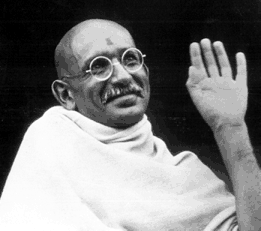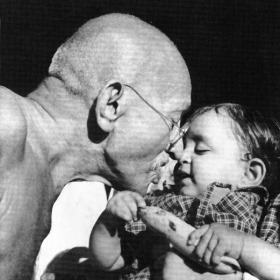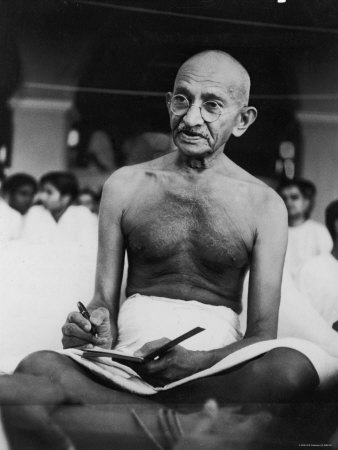 |
| Gandhi waving (Kingsley) |
"A small body of determined spirits fired by an unquenchable
faith in their mission can alter the course of history" (Gandhi). Having the
power to free a nation, unite a group of people under one cause, and break free
from an oppressive force all through civil disobedience is an amazing feat for
one man. Mohandas Karamchand Gandhi dedicated his whole life for India to
gain its independence from the British.
The British had a strict rule on India from 1858-1947. India was first owned by the East India Company, but was then passed to the crown. They controlled all of the country, and enforced harsh policies, imposed on the culture of the people, and monopolized industries. One of the primary concerns the Indian people against over British rule was the fear of being "Christianized", and restricted from practicing their own religions. Soon, groups of rebellions began to form within the Indian people, in hopes to take down British ruling. One of the most essential leaders of these rebellions was Mohandas Gandhi.
 |
| Gandhi with a child (Kingsley ()) |
Putlibai Gandhi, and his father was
Karamchand Gandhi. He was raised as a Hindu, which would later influence his
peaceful teachings, and views on society. He was married to Kasturba
Gandhi by the age of 13, an arranged marriage decided by the families, with no
input from the children. They eventually had four sons named Harilal, Manilal,
Ramdas, and Devdas. Gandhi's hunger and drive for education eventually lead him
to study Law at the University College London. During his time in London,
Gandhi stayed true to his religion, and was not changed by British culture. But
his time in Europe was cut short when he received the news that his mother had
died; he then returned to India as soon as possible. After his mother's death,
Gandhi moved to South Africa in hopes of finding work. But In South Africa, he
faced severe discrimination. On a train in Pietermaritzburg, he was asked to
move from first class to third class, in order to make room for a European
passenger, despite the fact that he had a valid first class ticket. He refused
to move for the European passenger, and was consequently beaten and forced into
third class seating. This incident shows that the Indian people were not only
oppressed within their own country, but they were viewed as a second class
citizen throughout the world. This incident
sparked Gandhi's passion in fighting for the equality of his people, and for
the right to their land.
The Civil disobedience Gandhi put himself through went to extremes. He was already a strict vegetarian, and firmly believed in eating to live, not living to eat. He gave up coffee, tea, sweets, and condiments in his cooking. As a way of protesting he went on hunger strikes in hopes that the British would agree to India's demands. The longest he fasted for was 116 days, surpassing the longest hunger strike which was 97 days. This achievement did get the attention of the British, and they ended up giving into the conditions India had set. Gandhi also obtained the support of many Indians to boycott British goods, such as cloth, and salt. He wanted the Indian people to make their own fabric and clothing. To help start this movement, he created a small foldable and portable spinning wheel, which made spinning fabric faster, and efficient.
 |
| Gandhi Praying (Kingsley ()) |
The British had monopolized the salt industry of India. The taxes on salt were so high no one could afford it, and they had made it illegal for the people to mine their own salt on the coasts of India. As a form of nonviolent protesting, Gandhi also led a salt march in 1930. They were traveling from Sabaramti to Dandi, a 240 mile march. He and 78 other followers embarked on this 23 day voyage to the coast. When finally reaching their destination, Gandhi and his supporters began to gather salt. But because this was against the law, he was soon arrested. But this movement was just the beginning of many more protests, and even the closing many of British stores.
Gandhi is my hero because of the way he achieved his goals. Being able to gain independence from one of the greatest empires of the time without using violence is something I find amazing. It would have been easier to convince a whole country to use violence against the British, and to use their anger as motivation. But Gandhi didn't do the easy thing; he did what he believed in. He convinced the majority of the Indian population to suppress their anger towards the British, and to peacefully fight for their rights as country. He was able to resist against any feelings of violence on the people who had oppressed his own people for years, and was able to convince an entire population to do the same. He was an amazing leader who never abused the power he had. He suffered with his people till the end. Gandhi was an amazing leader, and human being. He made a difference in the world through example, not force. Even though I might not be able to change the world at the age of 15, I can still stand up for what I believe in a peaceful way, even if I'm the underdog in the situation.
Works Cited
Benner, Alana. "Gandhi Salt March: 1930." Thenagain.info. David W. Koeller, 13 Sept. 2003. Web. 07
Dec. 2011.
Gandhi, Mohandas. "Mohandas Gandhi Quotes - BrainyQuote." Famous Quotes at BrainyQuote.
Brainy Quote, 2011. Web. 07 Dec.
2011.
Gandhi, Mohandas. "311chapter." Columbia University in the City of New York. Web. 07 Dec. 2011.
Kingsley, Ben. Photo of Gandhi. Digital image. 1982. Web. 2012.
hl=en&sa=X&gbv=2&biw=1280&bih=656&tbm=isch&tbnid=YuYh8B8uqjb3DM:&imgrefurl=http://deepak-doddamani.
blogspot.com/2011/08/doosra-gandhi.html&docid=sUfxwIVrtQ1x4M&imgurl=http://1.bp.blogspot.com/-
yLiwH3v56HA/Tlk91oDczUI/AAAAAAAAAhM/amZsJmkzttE/s1600/Gandhi.gif&w=261&h=231&ei=EAEHT4n-
J8_AtgeF5vjPBg&zoom=1&iact=hc&vpx=191&vpy=305&dur=93&hovh=184&hovw=208&tx=141&ty=78&sig=
114140842963889848994&page=2&tbnh=132&tbnw=149&start=25&ndsp=21&ved=1t:429,r:7,s:25>.
Szczepanski, Kallie. "Mohandas Gandhi - Biography." Asian History - History of Asia. The New York Times
Company, 2011. Web. 07 Dec. 2011.
Perkins,
Linda. "Mohandas Gandhi." Booklist 1 Oct. 2011: 60. General OneFile. Web. 7 Dec.
2011.Document URL http://go.galegroup.com/ps/i.do?id=GALE%7CA269689604&v=2.1&u=va_p_freder_a&it=r&p=GPS&sw=w
Page created on 1/11/2012 2:08:41 PM
Last edited 1/11/2012 2:08:41 PM
